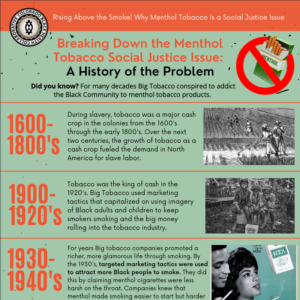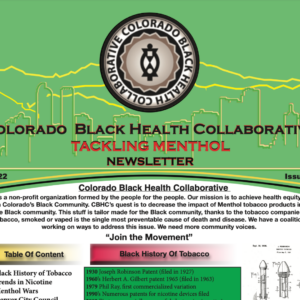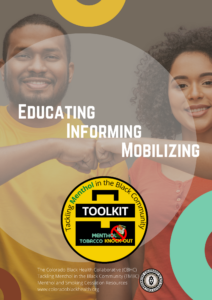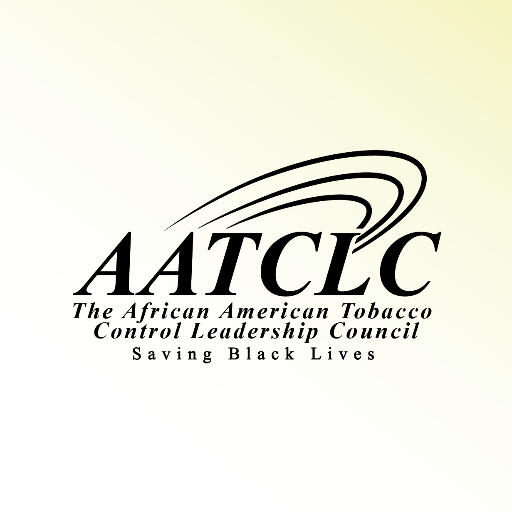What You Should Know…
Menthol flavored tobacco use in the Black Community has been a public health crisis since the 1950’s when Commercial Tobacco began its predatory marketing tactics directly targeting the Black Community. As of 2021 approximately 85% of Black smokers smoke menthol tobacco products. Through manipulation, marketing, and money Commercial Tobacco has negatively affected the health and well-being of the Black/African American Community.
Tobacco/Nicotine use is the single most preventable cause of disease, disability, and death in the United States. Tobacco/Nicotine use is a major contributor to the 3 leading causes of death among African American–heart disease, cancer, and stroke. Diabetes is the 4th leading cause of death among African Americans. The risk of developing diabetes is 30–40% higher for cigarette smokers than non-smokers.
Per a study in the American Journal of Public Health, it was suggested that preventing the sale of menthol cigarettes in the United States would lead to an additional 923,000 smokers quitting, including 230,000 African Americans in the first 13 to 17 months after a ban goes into effect. That’s why the Colorado Black Health Collaborative is fervently working to address this menthol tobacco social justice issue, because it matters! Fighting to SAVE LIVES!
Join the CBHC Coalition Today
The Colorado Black Health Collaborative (CBHC) Coalition is a united group of grassroots community members, and representatives from community and health organizations focused on the health and well-being of the Community. The Coalition is working to raise awareness, to educate and take action against the predatory marketing of menthol (and other flavored) tobacco products in our Community.
Follow us on Social
Stay up to date on the TMBC content, watch our media feeds, and continue learning how we can continue the fight against menthol in our communities.
Quizzes: How Much Do You Know?
The Menthol Ban
Tobacco Targeting the Black Community
Test Your Quitting Knowledge
Teen Smoking Facts
Test Your e-Cig Knowledge
Teen Vaping Knowledge
Education & Information
Breaking Down the Menthol Tobacco Social Justice Issue: A History of the Problem
Click the thumbnail to view
Menthol Tobacco Fact Sheets
Click a thumbnail below to view the full infographic.
Media
Real Talk Menthol Moment Spotlight Interviews
Click to watch the entire Real Talk Series with Thelma Craig.
Tackling Menthol in the Black Community Project Symposiums/Webinar
Rising Above the Smoke! Why Menthol is a Social Justice Issue Symposium
CBHC Coalition Special Session: Speaking Truth to Power
There’s power in telling your story! View our special CBHC Coalition special session entitled, ‘Speaking Truth to Power’ that took place on September 22th, 2021 in collaboration with the Flavors Hook Kids Denver Campaign. Special thanks to Rebecca Dubroff with the American Heart Association and our special session presenter Stephanie Clarke, founder of Shed Light: Storytelling for Social Impact.
Watch: How Long Will You Target Me?
Tobacco companies are targeting our families. Flavored tobacco products, like menthol, are being used to hook people of color on a lifetime of nicotine addiction. Why flavors? Because they make tobacco products easier to smoke and harder to quit. Give your family a chance to live a full, healthy life.
“How Long Will You Target Me” is a spoken word piece about how the tobacco industry uses flavored tobacco to target the Black Community and other communities of color. Many thanks to spoken word artist, Ryon Everidge, for creating this original piece and shining a light on the importance of eliminating the sale of flavored tobacco products.
Ready to Quit?
Cessation
(/seˈsāSH(ə)n/) noun: the fact or process of ending or being brought to an end.
Menthol tobacco/nicotine products are highly addictive and make it extremely hard to quit. The addiction is real and African Americans have more difficulty quitting. To help, CBHC is providing vetted culturally competent tobacco/nicotine cessation services/resources to assist Black/African American tobacco/nicotine users QUIT.
The Colorado QuitLine
A free telephone coaching service that connects people who want to quit smoking or using other tobacco products to an experienced Quit Coach (trained Counselor). Along with individualized coaching, the telephone service offers a free supply of nicotine patches or gum. The service is free to people calling from anywhere in Colorado. Click below to hear Denise’s perspective on quitting.
Are you ready to QUIT? Click here to find out how YOU can do it.
Tackling Menthol in the Black Community Toolkit
With a focus on health equity, especially for the Black Community, this Toolkit provides information and resources for those working in the tobacco/nicotine prevention space. The purpose for the Toolkit is to aid in educating, informing, organizing, mobilizing, and taking action to help save lives. This Toolkit is a living document that will evolve with updates and the addition of new content over time.
Resources
- The Center for Black Health & Equity is committed to the pursuit of health justice for people of African descent.
- The Fight Against Menthol: Menthol – The Center for Black Health & Equity
- Tobacco: Tobacco – The Center for Black Health & Equity
- Replay to Food and Drug Administration (FDA) Response on Menthol: FDA Response Presser
The African American Tobacco Control Leadership Council (AATCLC) educates the public about the effects of tobacco on Black American and African Immigrant populations, the tobacco industry’s predatory marketing tactics, and the need to regulate the sale of menthol and all flavored tobacco products.
Saving Black Lives – Promoting Healthy Black Communities Locally & Globally: Home | savingblacklives
The Public Health Law Center supports commercial tobacco control policy change and the commercial tobacco control movement throughout the United States, developing resources on the most effective legal policy measures that health leaders and policymakers can use to control the epidemic of commercial tobacco use in the United States and abroad.
Commercial Tobacco Control – Commercial Tobacco Control | Public Health Law Center
Press Releases & Editorials
The Truth Must Be Told | Colorado Black Health Collaborative | September 11, 2023
Opinion | Black History Has Taught Us That Big Tobacco Is Not An Ally | AATCLC | February 13, 2023
Breaking: 120 Orgs Call on UN Body for Help with Menthol | ASH | August 9, 2022
Fight Against Profit Before People and Public Health | Statement by CBHC | November 27, 2021
Take the Survey

Assist CBHC to advocate and fight against the menthol tobacco social injustice by providing feedback about this Resource Page. Please click on the “Take the Survey” Button below and complete the Survey.



















